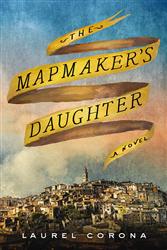Join a community of readers who are committed to Jewish stories
Sign up for JBC’s Nu Reads, a curated selection of Jewish books delivered straight to your door!
Laurel Corona is a professor of Humanities and World Religions at San Diego City College. Her newest book, The Mapmaker’s Daughter, will be published tomorrow by Sourcebooks. She will be blogging here all week for Jewish Book Council and MyJewishLearning.
 There’s nothing like old friends. They connect us with our past, remind us of the continuity of our life, embrace us in our totality, offer reassurance that what we have within us is enough to manage the future.
There’s nothing like old friends. They connect us with our past, remind us of the continuity of our life, embrace us in our totality, offer reassurance that what we have within us is enough to manage the future.
In my new novel The Mapmaker’s Daughter, the mikveh is that kind of friend. The protagonist, Amalia, stands guard as a young girl while her mother immerses in a spring near their home in Sevilla. It’s a dangerous act of “Judaizing,” as the secret continuation of Jewish practices by forcibly converted Spanish Jews was known.
Later, when she is grown, Amalia’s friend leads her on a rainy evening to a courtyard fountain, where they immerse in broken moonlight to commemorate the beginning of a seismic shift in Amalia’s thinking about the role of Jewishness in her life.
Amalia eventually passes on to her daughter the use of the mikveh not just as a means of monthly ritual purification, but as the symbol of the ongoing potential for fresh starts. The book ends with yet another mikveh of another generation of her family’s women.
I suppose I have put a rosy glow on what for many women must have been yet another burden — finding the time to purify themselves ritually to resume sexual relations with their husbands. Still I hope that among the millions of women who have followed this tradition over the centuries, there are some who saw the mikveh as I have presented it.
Maybe I see the mikveh the way I do because I was never burdened with it as an obligation. As a Jew by choice, I spent decades of my life unaware it existed, and even if I had grown up Jewish it is unlikely my family would have been that traditional. Perhaps that is the appeal of the mikveh today: not as an obligation but as a means to link an ancient tradition to a modern culture, one which provides more opportunity, time, and encouragement to reflect on and personalize our experiences.
As part of my conversion, I drove to Los Angeles to what is now called the American Jewish University. The preparation area was the equal of the nicest spa I have been in, and the pool was beautiful. A cloth partition separated the male rabbis standing on the other side, so they could hear but not see. I must admit I found the experience disconcerting and alien, as I struggled to get my whole body to submerge at once. The female monitor chirped pleasantly, “It’s kosher” each time I succeeded — another distraction, since the first thing I think of when I hear that word is food. It seemed like something I could check off a “to do” list rather than a meaningful experience, but I saw the potential and stored that thought away.
My most memorable experience with a mikveh happened in 2012, a few months after my husband’s death from prostate cancer. We had been together for eight years, and got married only seven weeks before he died. I was still grieving, but understood somewhere deep inside myself that I needed to move on before I settled into anything less than the full life I wanted. I invited a group of women (including two rabbi friends) to join me at La Jolla Cove early one morning, where we all rededicated ourselves to the lives we want to keep appreciating and the futures we are building. That was the concept of the mikveh I wanted to convey in The Mapmaker’s Daughter, although next time I will try not to include the incoming scuba diver who came up rather abruptly after catching sight of my back side without a bathing suit.
The Mapmaker’s Daughter is dedicated “in honor of the mikveh and the countless Jewish women who have restored their strength and optimism in its waters.” May it always be so.
Laurel Corona received a Christopher Medal for her non-fiction book Until Our Last Breath: A Holocaust Story of Love and Partisan Resistance (St. Martin’s Press, 2008), and in addition to The Mapmaker’s Daughter (Sourcebooks, 2014) has written thee other novels focusing on real women overlooked or misrepresented in history. Visit her website here.